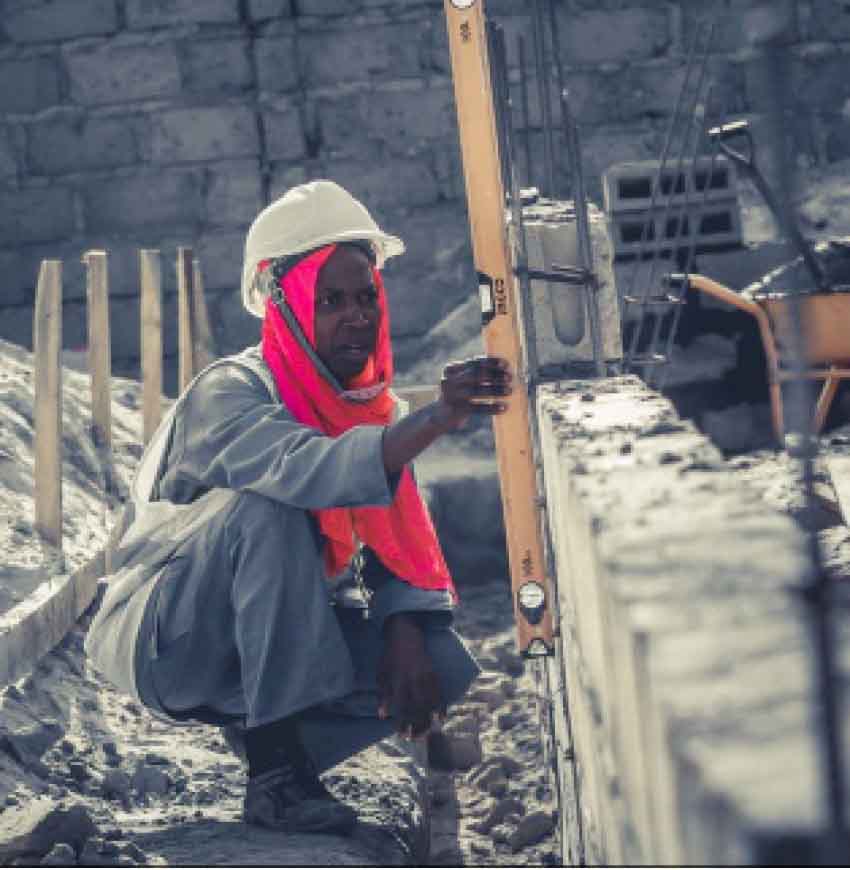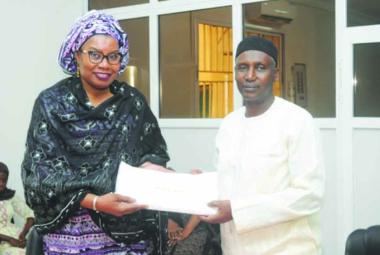By Awa Sowe
Imagine a gender equal world; a world free from bias stereotypes and discrimination; a world that is diverse, equitable and inclusive.; and a world where difference is valued and celebrated.
Moreover, imagine women thriving well in every professional field including ones considered as fields for men; such as civil engineering.
It is refreshing to see many young women now opting for civil engineering as a career option, a field that was widely regarded as a male-dominated field. When it comes to choosing streams such as civil, mechanical, or electrical engineering, women often receive messages like “this field is not for you.”
However, you cannot but notice that there are many engineering institutions encouraging young women to take a step towards their dream career in engineering. And the skewed gender inequality in the sector is still insufficient to dissuade women from pursuing engineering careers. Women who want to pursue a career in engineering should not be discouraged. If one has the aptitude, nothing should stop them from attaining their goal.
As designers, engineers, planners, thinkers, we all know that diversity of opinion is critical to solving problems or coming up with the best designs. Despite the obviousness of that statement, most industries and workplaces have taken some time to recognize the contribution that women can and should make. Of course, the last few decades have seen enormous leaps forward, creating more balanced working environments, where a more diverse group of voices can be heard. But it is taken too long to get there.
Gambia’s Mbasally Manneh is one of the women who have invested in a scientific career. She realised her dream to become an architect; her journey is inspiring and attention-grabbing
Growing up in Brikama Nema, Sally schooled in Presentation Basic Cycle School, then to SOS Herman Gmeina Senior Secondary School, where she read technical science, auto mechanics technicaldrawing, wood and metal work as well as further maths, physics and chemistry.
She later proceeded to Gambia Technical Training Institute (GTTI) where she did architectural draftsmanship and a Higher National Diploma in construction management. Upon completion she had a scholarship through the Ace Project 1 from the Ministry of Higher Education to pursue a master’sdegree in civil engineering.
Today Sally is the proprietor of Sally’s Engineering Firm, as well as a principal lecturer at the Construction Department, University of Science Engineering and Technology (USET) lecturing construction technology and architectural design.
Sally’s Engineering firm came upon after her graduation in 2018. Through her masters prgramme she acquired skills using software to do structural analysis and design. This, she revealed was what inspired her to establish a firm with 60% female workforce.
“I want to earn without depending on anybody so that I can inspire and encourage other female students,” she noted.
According to the female builder, anytime she is awarded with a contract she sub-contracts her female students to encourage them. “As female builders we have to proof ourselves and do more to convince people that we can do it”, she explained.
She further explained that all modern civilizations recognise women’s right to study and acquire a decent job as an undeniable right. Women empowerment is an important aspect in a country’s socio- economic growth, as well as improves women’s quality of life.
A difficult balancing act: “It was failure or success; I chose success
When the CEA programme in Cameroon offered her the opportunity to undertake a master’s degree, she was enthusiastic. Only one problem: Sally, who is married and already has a child, learnt that she was expecting a second. “I have never felt so lost”.
Reconciling the life of a student and a mother, moreover pregnant and in a foreign country was a major challenge. But Sally knows she has to go after her dreams. “For me, Yaoundé was failure or success; I chose success.
She hid her pregnancy from everyone, including her parents. Convinced that she would achieve her goals through her efforts and her involvement, she left for Cameroon to follow her three years of studies. With exams approaching, Sally feared she would give birth then. In fact, the baby arrived four days after her mathematical engineering exams.
“I sent a word home to Banjul to announce the birth of my second child. Everyone was flabbergasted, wondering how I could have given birth alone abroad, without my parents or my husband. Far from tearing me down, those experiences built me up to take on new challenges” she noted.
A Gender That Isn’t Physically Weak
Women are still regarded as the physically weaker gender, despite having already demonstrated their ability to go above and beyond expectations. Sally highlighted that in Africa, there is a widespread impression that women despise toiling in fields and increasingly taking on difficult tasks in different sectors as the world changes.
“I think the biggest challenge I had to face was overcoming impostor syndrome. According to the U.S. Bureau of Labor Statistics of the 475,000 Civil Engineers employed in 2019, only 14% are identified as women”.
“The way I have learned to slowly overcome impostor syndrome and self-doubt is surrounding myself with good support systems. Those I have met through social media, especially fellow women in STEM, have helped me greatly.
Bring in New Thoughts
Women can add a unique viewpoint to a project’s design and execution, resulting in more aesthetically pleasing structures. She went on to explained that It is 2024, and it’s shocking that we’re still debating on women’s civil engineering talents in this day and age.
She further explained that one thing that Sally’s firm dies differently do is to provide quality work at all cost with a guarantee of professionalism without looking into the financial gain to safeguard the company’s reputation
Defy Stereotypes
There is no field that women haven’t conquered yet. Women have an incredible ability to recognize and seize any conceivable opportunity. It’s terrible to see civil engineering stereotyped as a man’s job.
She mentioned that, women are succeeding in all fields, whether they work as a desk officer or in the field. “If it is a woman’s passion, the label of “man’s work” should not prevent her from pursuing it. All you need is conviction and the mental and physical toughness required by the civil engineering job profile,” she irritated
Pursue Your Passion
According to Sally,when it comes to finding a strong reason to pursue civil engineering, there is no other reason than this. It is worth it if you are doing what you love. It clearly does not matter, if it is going to be difficult or what people are going to think about it. If that is what you would like to do, you should definitely go for it.
In conclusion the Civil engineering expert, said that the key to success is persistence.
While we have come a long way in the last few decades in progressing equality between the sexes, it has not been uniform on the professional front. Civil engineering would be a lot richer with the greater participation of women. Whiles cultural attitudes towards women in engineering are hard to break, it is not impossible. Just remember that many women have succeeded in this industry despite their gender, and you can, too.






